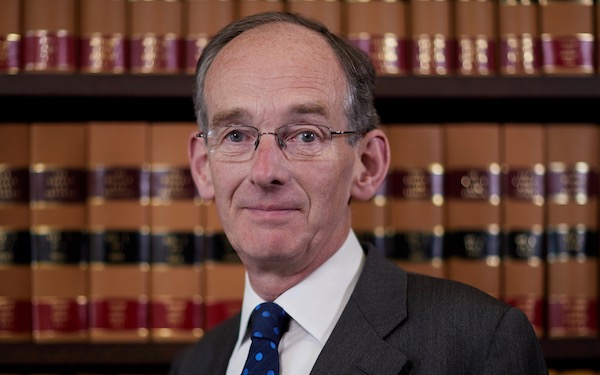
Parents are increasingly making covert recordings of social workers in child protection cases due to a lack of trust or for use in subsequent court proceedings, family justice leaders have warned.
However, despite the ease with which such recordings can now be made through smartphones, and their increasing frequency, guidance for practitioners on how to respond was “extremely sparse” and has not kept pace with need, said the Family Justice Council (FJC).
The FJC made the comments in new guidance designed to both address the gap in advice for practitioners on covert recording but also encourage professional bodies to produce their own guidelines to help staff navigate the issue.
The FJC guidance highlighted the potential harms from the use of covert recording, particularly to children, and provided advice on how the family courts should assess its evidential value. It also advised that organisations consider the use of overt recordings in situations where there was a breakdown of trust between professionals and parents.
Increasing use of covert recording
The FJC defined covert recordings as any made without the express knowledge and permission of the people being recorded, whether by video or audio.
It said the family courts were increasingly being asked to consider recordings made by parents of professionals, other family members or children, as evidence in proceedings. The recording of professionals – whether covert or overt – was “a growing phenomenon”, driven by reasons including:
- A lack of trust in social workers’ records of meetings, for example, due to the parent not having received notes from meetings, or having disagreed with the contents of notes received, in the past.
- Gathering evidence for later use in family proceedings.
- Sharing information as part of a campaign, for example, on social media, though the FJC stressed that this may not have been the original intention of the recording.
Legality of recordings
While the Regulation of Investigatory Powers Act 2000 requires public bodies to only use covert recordings if legal, necessary and proportionate, no such framework exists for private individuals, in relation to whom whom there was “confusion” over the lawfulness of the practice, said the FJC.
The guidance said that the processing of personal data – information that relates to an identifiable living individual – for purely domestic purposes, such as taking family photographs, was generally exempt from the UK General Data Protection Regulation (GDPR).
However, this exemption did not apply when the data was then processed in a professional setting, such as in meetings with social workers or for the purpose of family court proceedings, or published.
In such cases, this would require a lawful justification under GDPR, said the FJC, or the person risked committing the offence of unlawfully obtaining personal data, under the Data Protection Act 2018.
Whilst there was no specific criminal offence of using covert recording devices, it could, in rare circumstances, amount to the offences of harassment, stalking or coercive and controlling behaviour, for example, when one parent was making a recording of another, said the FJC. It could also be found to be a form of intimidation that could result in the person making the recording being the subject of an injunction.
Admissibility in family court proceedings
In any case where a covert recording was presented as evidence in family proceedings, the court would need to carry out “focused case management” to determine whether it should be admitted in evidence.
As it would almost always constitute hearsay evidence – a statement not given in oral testimony – this would involve considering whether it was covered by the Children (Admissibility of Evidence) Order 1993, which permits the use of such evidence, or was otherwise allowable.
The court would also need to assess the authenticity and accuracy of the recording, which may require expert evidence if these were disputed, as well as its relevance and value in the case, said the guidance.
However, the FJC warned that the costs, in time and money, of litigation to determine the admissibility of covert recordings were significant, and said “that the inherent intrusion of covert recordings on parents, children, and professionals, can also have harmful and sometimes unintended consequences”.
‘Profound consequences for the welfare of child’
The FJC raised particular concerns about the impact of recordings of children.

Photo: Binkontan/Adobe Stock
“Parents who covertly record their children usually do so in the belief that the recording will provide some significant evidence relating to a disputed issue in their case,” it said. “The number of cases where this has proved to be the case is few, if any.
“Against any perceived potential value of the secret recording are the profound consequences for the welfare of any child subjected by a parent to such a degree of invasion of privacy and breach of trust.”
The fact of such a recording would raise questions about the capability of the parent making it “to understand and promote their child’s emotional needs and protect them from harm”, it added.
Views of young people
Consultation with the Family Justice Young People’s Board, a group of young people with experience of the family courts that supports the FJC, “underscored the negative and harmful impact of covert recordings on young people”, said the guidance.
The FJYPB highlighted the likely feelings of betrayal children would feel, the potential for manipulation and coercion and the risk that the recording would create an “illusion of veracity” where, for example, the child’s words were designed to placate the parent or were part of a staged scenario.
They were more positive about the value of overt recordings, with the child’s consent, though stressed there would need to be clear guidance to ensure these were held by professionals and not parents, to avoid selective editing and sharing on social media.
Potential value of overt recordings
The FJC guidance said that, where there was a breakdown of trust between professionals and parents, this could potentially be overcome by the overt recording of meetings.
It included, as an appendix, previous guidance developed by guardians’ professional body Nagalro, highlighting the value of practitioners acceding to requests from families to record meetings, thereby avoiding the risks of covert recording.
The Nagalro guidance said this may encourage someone who was suspicious of the local authority to engage and would help rebut allegations that anything improper was said by the practitioner. It also stressed that the practitioner should not say anything in a meeting that they would not be happy for the court or parties to proceedings to hear.
Cafcass has also advised that practitioners should always be transparent in their work and that there was no legal reason why a parent or carer should not record an interview with a family court adviser, subject to any direction from the court.
Call to develop recording policies
The FJC advised agencies to “develop clear policies that provide for the circumstances in which such recordings can be made by consent, and how the data arising will be maintained, stored and accessed in compliance with the applicable statutory framework”. This should also cover the process for destroying recordings.
However, it stressed that recording meetings should not become the default and should never replace the need for practitioners to exercise professional judgment and make written records of meetings, highlighting the importance of non-verbal communication.
FJC chair, and president of the family division of the High Court, Sir Andrew McFarlane said: “Whilst some covert recordings have been found to have evidential value, the secret nature of covert recordings can intrude on the privacy of parents, children and professionals, causing harm and often leading to concerns about the accuracy of the recording.

Sir Andrew McFarlane, president of the family division of the High Court
“It is hoped that this guidance will encourage professional bodies and organisations in the family justice system to consider developing their own guidance on the use of covert and overt recordings.”
Cafcass said it welcomed the FJC’s guidance, with a spokesperson adding: “It aligns with Cafcass’ own internal guidance for its family court advisers when working with children and families where covert recordings are made.”







 Bournemouth, Christchurch and Poole
Bournemouth, Christchurch and Poole  Hampshire County Council
Hampshire County Council  Oxfordshire County Council
Oxfordshire County Council  South Gloucestershire Council
South Gloucestershire Council  Wokingham Borough Council
Wokingham Borough Council  Embedding learning in social work teams through a multi-agency approach
Embedding learning in social work teams through a multi-agency approach  The family safeguarding approach: 5 years on
The family safeguarding approach: 5 years on  Harnessing social work values to shape your career pathway
Harnessing social work values to shape your career pathway  Webinar: building a practice framework with the influence of practitioner voice
Webinar: building a practice framework with the influence of practitioner voice  Workforce Insights – showcasing a selection of the sector’s top recruiters
Workforce Insights – showcasing a selection of the sector’s top recruiters  Free CPD on Parkinson’s for health and social care staff
Free CPD on Parkinson’s for health and social care staff 

 Facebook
Facebook X
X LinkedIn
LinkedIn Instagram
Instagram
I recorded everything in relation to social workers. Would not have the evidence to prove they lied about my family. Maybe if they followed their regulations and protocols people would not loose faith in the system. I’d advise anyone to do this.
systemic erasure, eh! check out Julie Reshe on Maternal Ontology …
..
Best thing to do is always treat the parent with courtesy and respect, be honest, and challenge politely. If you always talk to parents like you are being secretly recorded, there won’t be a problem.
100% agree with you Abdul
but when the Official Solicitor ie CAFCASS (advocate to the Court or amicus curiae) is facing increasingly less support and pressure for change from Nagalro what standing does the Official Solicitor have …
… and crucially what’s the nature, degree and extent for the miscarriage of justice …
…. the haphazard commercialisation and marketisation of Children’s Services (see the CMA report) will undoubtedly colour mindsets …
… thoughts….
Recording social workers should be the norm. We did out of pure frustration when no one was listening. We proved she was lying and a two year battle was brought to a swift end.
We could have lost our children otherwise.
We were lucky.
Time lines are not met, they change their minds on appointments, last minute, and cancel them and then go ahead with the meetings without parents present only to document the parent never showed.
They accuse you of been challenging, aggressive and not working with them.
There’s just no way to fight it or prove them wrong.
Every meeting should be recorded and presented in court. It really is and should be that simple.
Yes the system should allow parents to record social workers.
I think this shows that this system, like many others, is broken. And there is very little faith or trust in social services, anyone in this position either the social worker or parent should have the right to record meetings & present the recording as evidence.
I believe all interactions with any professional should be video recorded to give an accurate account of what was discussed. Unfortunately I’m going through a horrific time at the moment.
When I tried to be overt and open with the recordings they asked me to sign a ridiculous working agreement basically giving them the rights to the video, after that I just did it covertly.
When it comes to recording children I think we need to be very careful. The point of the recordings should be to ensure the truth is told accurately, not to deceive or entrap. We should be looking out for the children’s best interests, not trying to weaponise them.
As a SW in child protection I have told people they can record me. I don’t like being video recorded as that feels intrusive (I don’t really want someone uploading videos of me to their social media for example ) but if someone wants a voice recording I see no issue with that. I have always thought it’s safer to assume people sre recording you rather than be shocked. I always think having child protection services in your life must be so
intrusive that it doesn’t surprise me that people don’t tell the truth or do things like record.
I have had social workers materially mis-represent what was said, who said it, and what was agreed. This has been done in their verbal accounts, written minutes, formal reports, and in court. There is a reason that trust breaks down.
Maybe instead of looking into ways to stop parents recording meetings look into giving parents the same effort the social work put into the foster carers, We are people who might need some help not for it to be flung into our faces
As long as the professional doesn’t lie, being recorded is fine. The only people afraid of having their words recorded are those who will lie and want the truth hidden. Should such people be allowed to get away with lying to the court? Absolutely not! Record everything and for goodness sake just tell the truth
I want to speak honestly as someone who has worked closely with families and seen how the system treats them. Some parents feel they have no choice but to record social workers without telling them. This is not because they want to cause trouble, it is because they do not feel safe or listened to.
Many parents have told me they do not trust what is written in meeting notes. Sometimes they never get the notes, and when they do, parts are missing or changed. When you are fighting to keep your child, every word matters. Parents just want a fair chance. Recording is the only way they feel they can protect themselves and show what really happened.
I understand the concerns about children being recorded. But let us not forget, the biggest harm to a child is being removed from their family based on things that might not be true. If a recording helps to show the full picture, it could stop a mistake. That is in the child’s best interest too.
Some say recordings are unfair to professionals. But I ask, who protects the parent when they are treated unfairly? There is a power difference. Social workers have teams, lawyers, and the system on their side. Parents often have nothing. If recording helps them feel safer or gives them a voice in court, can we really blame them?
If open recording is better, then let’s make it normal. Offer parents the chance to record meetings openly and share the recording with everyone. This will stop people from feeling like they have to hide it. It will also help build trust.
Right now, we are blaming parents for something that is just a symptom of a bigger problem. The real issue is that many parents feel ignored, judged, or even targeted. Until the system becomes more fair, more open, and more respectful, parents will keep doing what they need to do to feel safe.
We should not be asking why parents are recording. We should be asking what made them feel they had no choice.
Why is this even being raised if the social workers are acting professionally and in line with their relevant codes of practice then a parent having a record for themselves of interactions is nothing to worry about.its only those social workers not behaving appropriately that have anything to worry about. Secondly it is the parents private data, and until a child reaches a certain competence it is the parent who consents on behalf of child re Personal data. It is correct that those whose personal data may be impacted through incorrect record keeping have a way to challenge this to get records amended. The professional should not be sharing their personal details beyond that that they are professionally required so nothing in a recording should be a surprise to a social worker acting in a professional and lawful manner.
To get around this audio visual issue. I use a livescribe, it keeps no audio but creates a written transcript of everything it hears. I’ve had to resort to this due to past trauma and abuse affecting my memory and recall as well as due to the abhorrent way I’ve been treated by some social workers in the past. I will continue to protect myself and my children this way when it comes to dealing with authority. I’ll only use these transcripts if I need to and I’ve never used my livescribe on my children only in meetings with authorities. Parents are only doing this now because they feel they have no other choice to protect themselves
All communication should be recorded because when local authorities have something to hide they abuse their power.
I record social workers. What they say to my face or on a phone call are frequently not what is said in the meeting minutes, or follow up email if these are provided at all. These meetings are too important to be undocumented. I don’t record my child. Social workers should routinely record meetings so they can protect themselves, the child and parents. This should be open and correctly done in line with data protection laws.
… Eileen Munroe writes about error reduction in 2022 …
… uncertainty reduction theory has been kicking about since 1975 …
… driving out the fear uncertainty creates is taking decades, why? …
I’ve had a director of children’s services accuse me of infringing on his workers rights, six months later he confirmed that their legal team had confirmed that I had acted legally. Data Protection Act 1998 has exemption for professionals acting on behalf of an organisation that private individuals do not need to seek consent to record although are still legally obligated to safely store data and not share without purpose as per Data Protection and GDPR. Our family wouldn’t have a leg to stand on if we didn’t have evidence of bullying and harassment from worker, failure to record disclosures and repeatedly either failing to record contacts and meetings or completely falsifying notes, even of a student doing an unsupervised CPR visit.
Sadly, the reasons stated for a lack of mistrust towards social workers are all too common. So many people, birth parents and foster carers alike have experienced social workers twisting words, receiving inaccurate or even made up minutes or simply never receiving any. Birth parents are often given no respect or consideration, despite the LA having shared parental responsibility but this often does not equate in reality. So many also experience breadcrumbing when it comes to their children and goal post constantly moving. The answer is not to provide social workers with guidance about how to manage overt recordings. These recordings would reduce in number if birth families felt safe to say what they need to, without fear of their words being twisted and used against them.
parents recording for their own protection down the line should be allowed as long as it’s not posted on social media or shared and is solely done for their safety and their children’s safety shouldn’t be an isssue
Seems my reply was censored.
Must have been too strong a case highlighting the known abuse of social workers and the organisations they work for.
Due to ‘MISTRUST’ in professionals and the system, parents have resorted to recording. If parents’ recordings are used for a particular purpose such as legal evidence and not shared on social media, ‘privacy’ in a way is not bridged. The question would be ‘where else are these recordings being shared?’. When parents record their children for legal evidence, this could be questionable as the recording could be biased and not representative of the entire situation.
On the other hand, social workers have a range of vital information about families and as per good practice, sharing reports/assessments with parents/families is crucial. It is obvious that mistakes can be made when recording – if the social worker has built an honest, open and good working relationship with the parents/families, they would likely be more willing to identify mistakes, to be corrected.
There is massive power imbalance between social services and parents/families. Social workers may become defensive when triggered and they could ‘forget’ about their humanity and focus on ‘professionalism’. Social workers have vast support to back them up including management, local authority, legal team, etc, whereas parents/families have limited support who have little or no influence on the decisions. If social workers use supportive rather than punitive approach, then parents/families might not see the need for recording conversations/meetings.
As a child protection social worker, I have encountered a new case where the parent told me that they would record every conversation because of mistrust for professionals in general and social services in particular. I had no objection to the audio recording.
I strongly feel there is a distraction from the main ‘issue’ of ‘mistrust’. I understand that FEAR is at the core of this issue and rather than focusing on recording which parents use as a safety net, Social services needs to start exploring ”what needs to be done to rebuild trust”. Systemic improvement is needed and social workers to be supported with personal development to deal with their own core issues that may reflect in their authenticity in practice.
Parents need to take the responsibility to address the issues that led to social services’ involvement and individual social workers to reflect on their personal fears and how that influences/impact their practice.
Nelly, your comments are accurate in my opinion.Due to the current lack of respect and dignity given to parents and the workforce, it is not a surprise that parents feel the need to protect themselves.
Parents have the right to ask questions and given honest accurate information,they have the right to challenge decision making,they have the right to expect professional practice at all times,however parents also need to understand there is a reason why social services are involved.
To be accurate some professionals’ attitudes can be worrying therefore it is no wonder there is mistrust in the profession.Until the service address a number of issue’s and todays mind set, trust in the profession will not improve resulting in continued conflict between the parents and social workers, this then leads to the focus being diverted away from the needs of the child and delay in proceedings/plans in respect of the child.Perhsps there needs to be an independent agency to safeguard parents rights.Recording meetings can be misused before meaningful discussions can take place to resolve the conflict.
I completely agree with much of what has been said here; I’ve never had any issue with being recorded and have, I’m confident, always conducted myself in a way I’d be happy for other people to hear. Not because I might be being recorded at any point, but because I want people to feel respected by me. And recordings have never proven an issue for me; several times in my career I’ve had parents tells me they had covertly recorded initial discussions with me and stopped doing that because it didn’t feel necessary anymore.
There are a few issues, though, that I don’t think these comments address. It is right to point to the power and backing social workers have within “the system”. But outside of that system, they can be incredibly vulnerable. Social media can be febrile, vicious and unrelenting. Plenty of social workers fear being recorded not because of a lack of integrity, but because they do not know how those recordings might be used. I have seen recordings be manipulated and shared online to an audience who uncritically accept any criticism of social workers and seen that have a significant real-life impact on that social worker. There’s also the question of just what it is that recordings, in general, evidence. There will be occasions social workers lie. Probably many more occasions than feels believable and comfortable for me, I accept that, but I still expect it to be very far from the norm. There will be, I expect, more occasions where (perhaps equally or even more damning?) social workers did not have the professional skill or courage in the moment to say something to a parent that was difficult or scary to say and so only made its way into written recordings from the safety of an office. There will be even more occasions where social workers had very different views on and frames of reference for what needed to go into a written recording and what didn’t to that a parent might have, where things that feel important for parents don’t carry the same weight for social workers and so get omitted. I’ve sat through hours of recordings parents have asked me to listen to of discussions with social workers I’ve managed, where they have described social workers as lying. What I’ve generally heard isn’t anyone lying (either social worker or parent) at all, but two people speaking completely different languages. I’m very wary of AI but do wonder of this and real-time collaborative recording is the way to go on this.